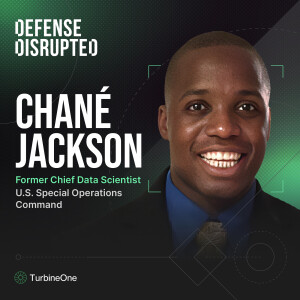
Monday May 05, 2025
TurbineOne’s Chané Jackson on How Human-Machine Teaming Reduces Cognitive Load in Combat
From the frontlines to AI deployment at the tactical edge, Chané Jackson, Former Chief Data Scientist for U.S. Special Operations Command brings 20+ years of military experience to our inaugural episode of Defense Disrupted.
Chané shares how machine learning and AI are transforming battlefield operations while discussing the challenges of implementing these technologies in disconnected environments for today's warfighters. He also offers specific examples of how biometric systems enabled immediate person identification in the field, accelerating critical decision cycles that previously relied on manual verification. Chané emphasizes that effective military technology must solve specific operational problems rather than applying complex AI solutions universally — sometimes a simple decision tree analysis is more effective than neural networks in tactical environments.
Through conversations like this with military professionals, technology experts, and implementation specialists, our host Ian Kalin, CEO & Co-Founder of TurbineOne, will explore practical insights about deploying machine learning at the edge, emerging trends in field operations, and success stories from those accelerating threat recognition.
Topics Discussed:
- How Special Operations is evolving from conventional force deployments to small teams operating in denied environments, requiring advanced technology to scale capabilities and minimize personnel exposure in future conflicts.
- The transformation from infantry soldier to data science team leader, demonstrating how military career paths can adapt to incorporate technical expertise while maintaining operational relevance.
- Implementing battlefield biometrics that enabled rapid identification of persons of interest in combat zones, allowing operators to make faster, more confident decisions with immediate verification capabilities.
- The integration of autonomy and human-machine teaming to reduce cognitive load on operators who previously tracked critical battlefield information manually while on the move.
- How disconnected environments present unique challenges for deploying AI at the tactical edge, requiring solutions for collaborative autonomy that can maintain functionality without reliable communications.
- Adapting mathematical modeling and decision tree analysis for battlefield applications when deep learning neural networks aren't practical due to data constraints in tactical environments.
- The evolution of military technology requirements from the 2012 Afghanistan deployment (using handwritten notes on wristbands) to modern data-intensive operations that require AI assistance to process multiple information streams.
- Problem-first approach to military technology implementation: focusing on specific operational challenges rather than forcing AI solutions where simpler statistical methods might be more effective.
Disclaimer: The views expressed in this podcast are those of the hosts and guests and do not reflect the official policy or position of the Department of Defense, the U.S. Government, or any of its affiliated agencies.
No comments yet. Be the first to say something!